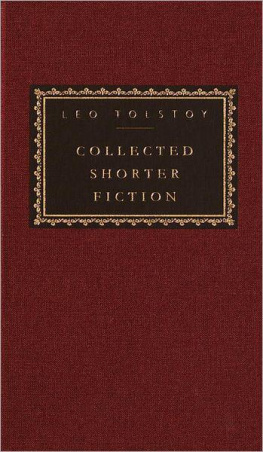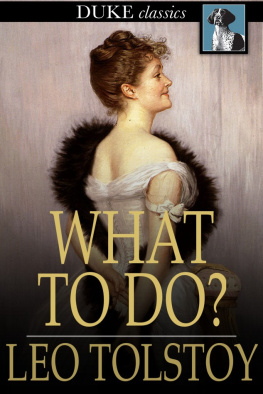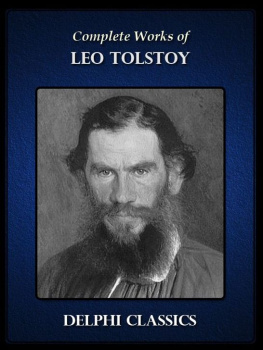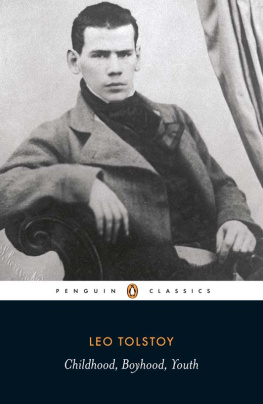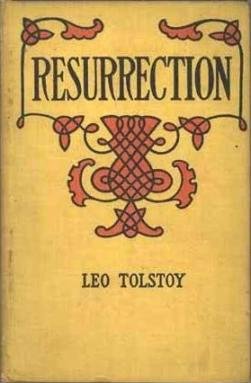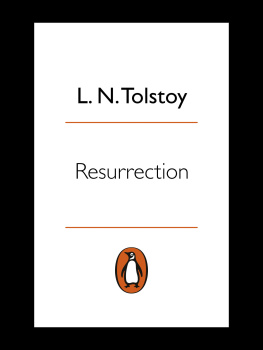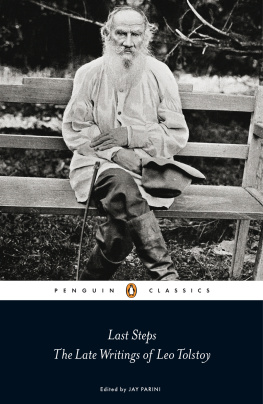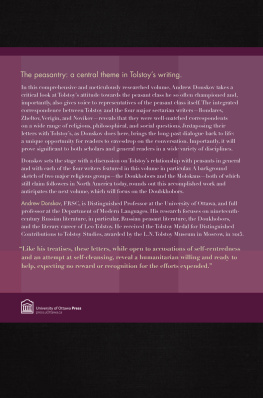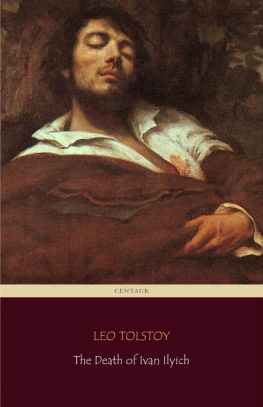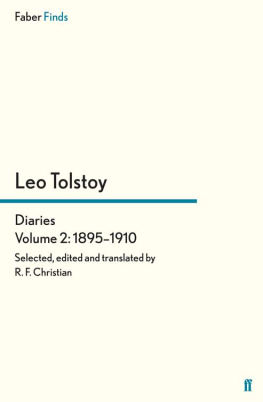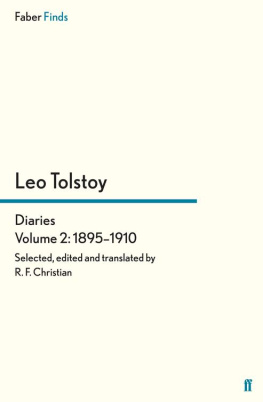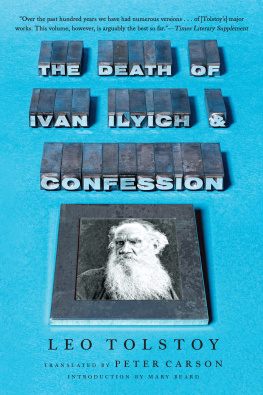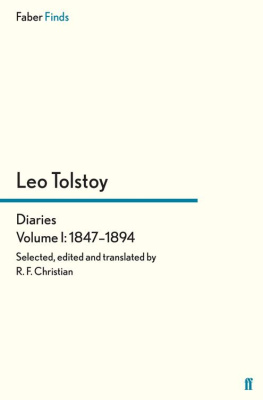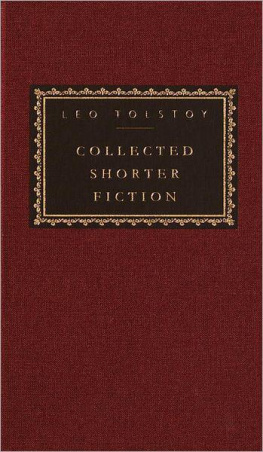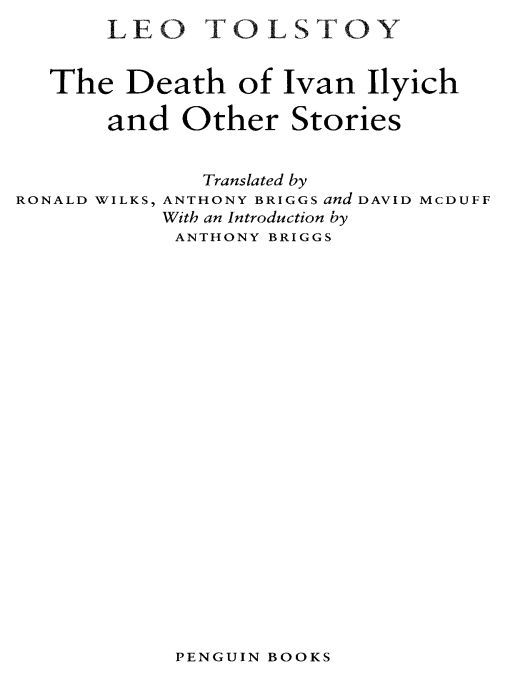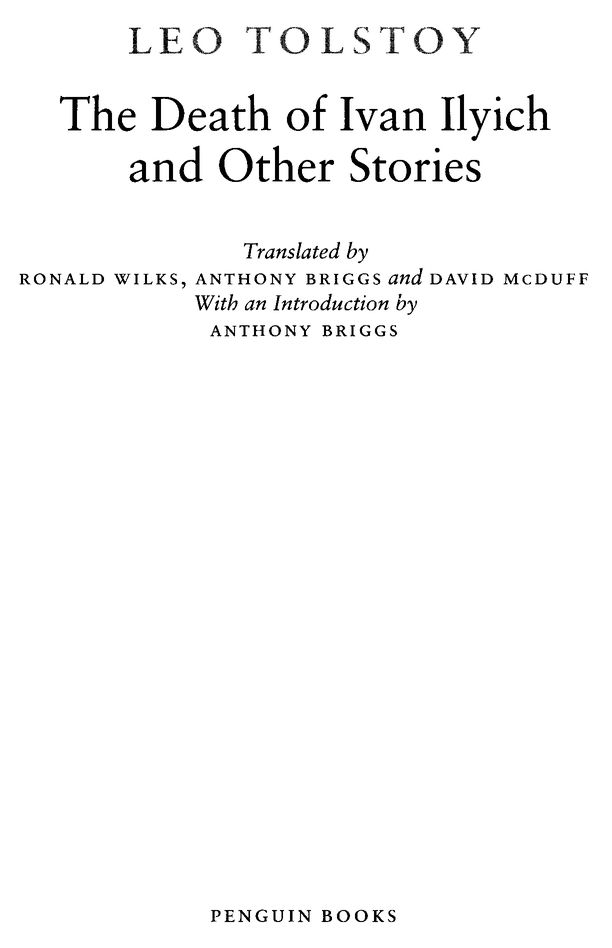Table of Contents
THE DEATH OF IVAN ILYICH AND OTHER STORIES
COUNT LEO TOLSTOY was born in 1828 at Yasnaya Polyana in central Russia, and educated privately. He studied Oriental languages and law (unsuccessfully) at the University of Kazan, then led a life of dissipation until 1851, when he went to the Caucasus and joined an artillery regiment. He took part in the Crimean War, and on the basis of this experience wrote The Sevastopol Stories (1855 6), which confirmed his tenuous reputation as a writer. After a period in St Petersburg and abroad, where he studied educational methods for use in his school for peasant children at Yasnaya Polyana, he married Sofya (Sonya) Behrs in 1862. The next fifteen years was a period of great happiness. The couple had thirteen children; Tolstoy managed his estates, one in the Volga steppeland, continued his educational projects, cared for his peasants and wrote War and Peace (1869) and Anna Karenina (1878). A Confession (1884) marked a spiritual crisis in his life; he became an extreme moralist and in a series of pamphlets after 1880 expressed his rejection of state and church, indictment of the weaknesses of the flesh and denunciation of private property. His last novel, Resurrection (1900), was written to earn money for the pacifist Dukhobor sect. His teaching earned him many followers at home and abroad, but also much opposition, and in 1901 he was excommunicated by the Russian Orthodox Church. He died in 1910, in the course of a dramatic flight from home, at the small railway station of Astapovo.
ANTHONY BRIGGS, Senior Research Fellow at Bristol University and Professor Emeritus at Birmingham, has written, translated or edited many books and articles on Russian and English literature. A leading authority on Aleksandr Pushkin, he has also edited five volumes of English poetry. His recent translation of War and Peace for Penguin has been widely acclaimed.
DAVID MCDUFF was born in 1945 and was educated at the University of Edinburgh. His publications comprise a large number of translations of foreign verse and prose, including twentieth-century Russian and Scandinavian works. He has translated a number of nineteenth-century Russian prose works for the Penguin Classics series. These include Fyodor Dostoyevskys Crime and Punishment, The Brothers Karamazov, The Idiot, The House of the Dead and Poor Folk, Leo Tolstoys The Cossacks, and Nikolay Leskovs Lady Macbeth of Mtsensk. He has also translated Isaak Babels Red Cavalry and Andrey Belys Petersburg for Penguin.
RONALD WILKS studied Russian language and literature at Trinity College, Cambridge, after training as a Naval interpreter, and later Russian literature at London University, where he received his Ph.D. in 1972. Among his translations for Penguin Classics are My Childhood,My Apprenticeship and My Universities by Gorky, Diary of a Madman by Gogol, filmed for Irish Television, The Golovlyov Family by Saltykov-Shchedrin, How Much Land Does a Man Need? by Tolstoy, Tales of Belkin and Other Prose Writings by Pushkin, and six other volumes of stories by Chekhov: The Party and Other Stories, The Kiss and Other Stories, The Fiance and Other Stories, The Duel and Other Stories, The Steppe and Other Stories and Ward No. 6 and Other Stories. He has also translated The Little Demon by Sologub for Penguin.
Chronology
1724 Pyotr Tolstoy (great-great-great-grandfather) given hereditary title of Count by Tsar Peter the Great
1821 Death of Prince Nikolay Volkonsky, Tolstoys grandfather, at Yasnaya Polyana, Tula Province, 130 miles south-west of Moscow
1822 Marriage of Count Nikolay Tolstoy and Princess Marya Volkonskaya
1828 28 August (Old Style). Birth of fourth son, Leo Nikolayevich Tolstoy, at Yasnaya Polyana
1830 Death of mother
1832 The eldest son, Nikolay, informs his brothers that the secret of earthly happiness is inscribed on a green stick buried at Yasnaya Polyana (Tolstoy later buried there)
1836 Nikolay Gogols The Government Inspector
1837 Death of Aleksandr Pushkin in duel Death of father
1840 Mikhail Lermontovs A Hero of Our Time
1841 Death of Lermontov in duel Death of first guardian Alexandra Osten-Saken, an aunt. The Tolstoy children move to Kazan to live with another aunt, Pelageya Yushkova
1842 Gogols Dead Souls
1844 Enters Kazan University, reads Oriental languages
1845 Transfers to Law after failing examinations. Dissolute lifestyle: drinking, visits to prostitutes
1846 Fyodor Dostoyevskys Poor Folk
1847 Inherits estate of Yasnaya Polyana. Recovering from gonorrhoea, draws up scheme for self-perfection. Leaves university without completing studies on grounds of ill health and domestic circumstances
1848 50 In Moscow and St Petersburg, debauchery and gambling, large debts. Studies music
1850 Ivan Turgenevs A Month in the Country
1851 Travels to the Caucasus with Nikolay, who is serving in the army there. Reads Laurence Sterne: starts translating his Sentimental Journey (1768) (not completed). Writes A History of Yesterday (unfinished, first evidence of his powers of psychological analysis). Begins writing Childhood
1852 Death of Gogol. Turgenevs Sketches from a Hunters Album Enters the army as a cadet (Junker); based mainly in the Cossack station of Starogladkovskaya. Sees action against the Chechens, and narrowly escapes capture Childhood
1853 Turkey declares war on Russia The Raid
1854 France and England declare war on Russia. Crimean War starts Commissioned, serves on Danube front. November: transferred at own request to Sevastopol, then under siege by allied forces Boyhood
1855 Death of Nicholas I; accession of Alexander II In action until the fall of Sevastopol in August. Gains celebrity with Sevastopol in December and further sketches, Sevastopol in May, Sevastopol in August 1855 (1856), Memoirs of a Billiard Marker, The Woodfelling
1856 Peace signed between Russia, Turkey, France and England Turgenevs Rudin In St Petersburg, moves in literary circles; associates with Turgenev, Ivan Goncharov, Nikolay Nekrasov, Afanasy Fet and others. Leaves the army. Death of brother Dmitry The Snowstorm, Two Hussars, A Landowners Morning
1857 February-August. First trip abroad, to Paris (lasting impression of witnessing an execution by guillotine), Geneva and Baden-Baden Youth, Lucerne
1858 Long-term relationship with peasant woman on estate, Aksinya Bazykina, begins Albert
1859 Goncharovs Oblomov; Turgenevs The Home of the Gentry Founds primary school at Yasnaya Polyana Three Deaths, Family Happiness
1860 Death of brother Nikolay from tuberculosis Dostoyevskys Notes from the House of the Dead (1860-61). Turgenevs On the Eve
1860 61 Emancipation of serfs (1861). Other reforms follow: Elective District Councils (zemstvos) set up (1864); judicial reform (1865). Formation of revolutionary Land and Liberty movement. Commencement of intensive industrialization; spread of railways Serves as Arbiter of the Peace, dealing with post-Emancipation land settlements. Quarrels with Turgenev and challenges him (no duel). Travels in France, Germany, Italy and England. Loses great deal of money through gambling. Meets Pierre-Joseph Proudhon in Brussels


